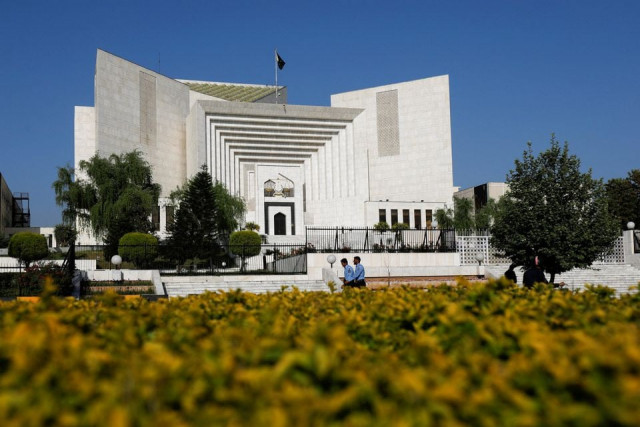SC disregards 2-judge verdict deferring suo motu cases
Registrar says Justice Isa-led bench violated rules laid down by majority judgement

The Supreme Court (SC) on Friday “disregarded” a judgment authored by Justice Qazi Faez Isa ordering the postponement of suo motu cases till amendments were made in the SC Rules 1980 regarding the discretionary powers of the chief justice to form benches.
In its circular, Chief Justice of Pakistan (CJP) Umar Ata Bandial noted that the observations made by the majority judgment in paras 11 to 22 and 26 to 28 were beyond the matter fixed before the court and “invokes its suo motu jurisdiction”.
Interestingly, the apex court issued the circular hours before a four-member bench was to start hearing the Punjab and Khyber-Pakhtunkhwa (K-P) elections’ delay case.
The circular noted that the “unilateral assumption of judicial power” in such a manner violated the rule laid down by a five-member judgment.
“Such power is to be invoked by the Chief Justice on the recommendation of an Honourable Judge or a learned Bench of the Court on the basis of criteria laid down in Article 184(3) of the Constitution. The said majority judgment therefore disregards binding law laid down by a larger bench of the Court,” the circular read.
“Any observation made in the said judgment, inter alia, for the fixation or otherwise of cases is to be disregarded. Accordingly, a circular be issued by the Registrar stating the foregoing legal position for the information of all concerned,” the circular concluded.
What was the judgment?
On Wednesday, a special SC bench, with a two-to-one majority, ordered suspending all suo motu cases — under Article 184(3) of the Constitution — until amendments were made to the SC rules governing the chief justice's discretionary powers.
The special bench order came on the suo motu case related to examining the award of additional 20 marks to Hafiz-e-Quran candidates applying for enrolment to an MBBS/BDS degree. Justice Isa headed the bench comprising Justice Aminuddin Khan and Justice Shahid Waheed.
CJP Bandial had formed the three-member special bench to hear the case, but Justice Isa objected to the constitution of the bench.
Justice Waheed — who also wrote a dissenting note against the order — raised objections, saying: "The points raised and discussed in the order were not subject to the case."
The order, penned by Justice Isa, mentioned: "The Supreme Court Rules, 1980 (the Rules) neither permit nor envisage special benches. However, a Special Bench comprising of three Judges was constituted to hear this case."
The majority order said the top court comprises the CJP and all judges.
"The Constitution did not grant the Chief Justice unilateral and arbitrary power to decide the above matters. With respect, the Chief Justice cannot substitute his personal wisdom with that of the Constitution," the order stated.
Collective determination by the chief justice and the judges of the apex court could also not be assumed by an individual, albeit the chief justice, the order said.
The SC registrar said that the order violated the rules laid down by a five-member judgement.



















COMMENTS
Comments are moderated and generally will be posted if they are on-topic and not abusive.
For more information, please see our Comments FAQ